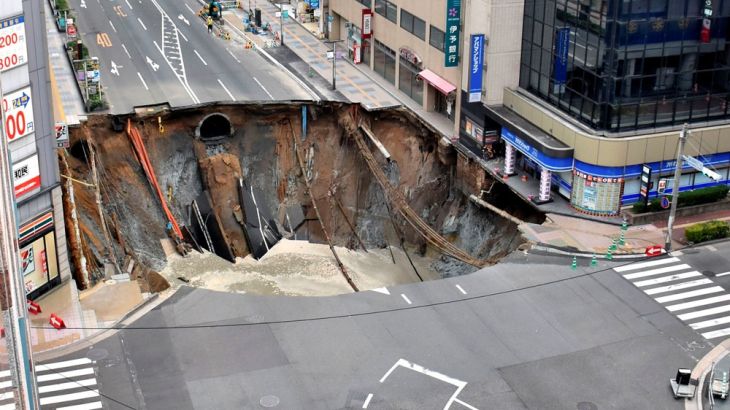Giant sinkhole swallows Japanese street
Major road in Fukuoka disappears, prompting evacuations from nearby buildings.

A giant sinkhole has opened up in the Japanese city of Fukuoka.
Residents of the city on the north coast of Kyushu saw the sinkhole swallow an entire five-lane road in the middle of the city.
Keep reading
list of 4 itemsScientists say Oman, UAE deluge ‘most likely’ linked to climate change
Photos: Deadly floods wreak havoc in Kenya’s capital
China evacuates over 100,000 as heavy rain continues to lash south
Japanese authorities evacuated people from nearby buildings as a safety precaution, but despite widespread disruption to traffic, and to supplies of electricity, water and gas, incredibly there were no injuries.
The massive sinkhole near Hakata Station measured 27 metres wide and 30 metres long, with water from broken pipelines flooding the 15-metre-deep hole.
Sinkholes are not as rare as you may think. In September this year, a huge sinkhole opened up in Florida underneath a fertiliser plant.
And in 2013, another sinkhole in Florida suddenly opened up in the east Tampa suburb of Seffner and swallowed a man while he slept in his bed.
Despite frantic digging, his brother was unable to rescue him.
In the majority of cases it is the weather which triggers such huge holes to appear in the ground.
The ground collapses when the rock underneath the surface soil, known as bedrock, gives way.
This often happens when the bedrock is made of tiny pieces of rock or shells which have been compacted together into a solid substance called sedimentary rock.
These rocks have a rather fundamental flaw in that they dissolve in water.
Every time it rains, water filters down through the bedrock, causing it to slowly erode.
This causes cracks to appear in the bedrock which gradually widen, creating empty cavities beneath the surface.
The rainwater will then gradually wash the surface soil down into the cavities, weakening the surface.
Eventually the soil above the cavity is no longer be able to support itself and the ground collapses.
Local authorities are investigating the cause of the latest sinkhole in Japan, but reports suggest ongoing subway construction work nearby may have been a factor.
Additional reporting by Steff Gaulter